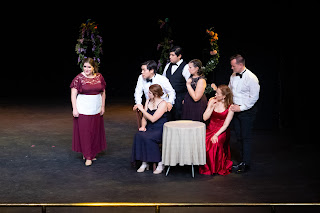By Harry Forbes
“You’re about to see a flop,” VHRP Artistic Director Alyce Mott impishly teased the packed house a few moments before the curtain parted for Victor Herbert’s 1899 adaptation of Rostand’s great play. Rostand’s original had been written a mere two years earlier, and was well known to American audiences from both Richard Mansfield’s authorized production, and various burlesque adaptations.
Adapting the play on this occasion was the brainchild of noted comic opera star Francis Wilson, who was also producing. He apparently hoped to combine his much praised buffoonery with something classier. But book writer Stuart Reed, by all accounts, failed to find a balance between the serious and the lowdown comic elements. Herbert, for his part, wrote a score in keeping of Rostand. The result was an uneasy mix, and the piece did indeed shutter after a mere 28 performances. (A subsequent tour was no more successful.) Mixed reviews acknowledged the quality of the music, but felt Wilson’s comic antics were discordantly out of place.
As the original book is now lost (or at least unavailable), Mott had no choice but to write her own libretto based on Rostand, restoring a tragic ending (unlike Reed’s version) and shoehorning Herbert’s tunes to fit.
Mott’s version was first heard in a 1999 concert with the Little Orchestra Society at Lincoln Center. The late Dino Anagnost conducted his large orchestra and New Yorkers experienced the score for the first time in a century. A piano-only version production with a cast of five with her brand new VHRP group followed in 2013. The current performance expands those editions to something approaching full-length, though three acts have been condensed to two, there’s been some shuffling of song order to accommodate the new book, and some verses of individual songs have been cut. (Some of those were so tuneful, I regretted not hearing the second verse.) As far as I can judge, only two songs have been cut completely: the Chorus of Poets, and Cyrano’s “Diplomacy” number.
The well-known plot follows its usual course: poet/soldier Cyrano (Matthew Wages) loves Roxane (Hannah Holmes), his distant cousin, but presumes she couldn’t love him because of his large nose. (We have to take that on faith, as there are no prosthetics used here). She, in turn, falls for the handsome but inarticulate cadet Christian (Ai Ra). Out of love for Roxane, Cyrano agrees to equip Christian with the eloquent words he needs for wooing.
What is evident -- as was the case with Mott’s prior productions -- is that the work is a piece of quality, and one can empathize with the reaction of those 19th century critics who recognized it as such, but bemoaned the lack of voices to do the score justice. Though praising the chorus and orchestra, the Times wrote, “So far as the solo numbers went, one had to guess what most of them would sound like if they were well sung.”
Such was decidedly not the case with VHRP’s current cast. Wages’ Cyrano was strongly sung and authoritatively acted with no silly clowning. He nailed his numbers like “Song of the Nose” and his duets with Roxane with rich tone and sincere feeling.
And Holmes’ Roxane sang with firm voice and, like Wages, exemplary diction, no doubt trumping the role’s originator, one Lulu Glaser. “I Am a Court Coquette,” the waltz “I Wonder,” and “Over the Mountains” were beautifully vocalized.
Jonathan Hare was outstanding as Le Bret leading a rousing “Cadets of Gascony” and, later, as the Minstrel, excelled in “‘Neath Thy Window.”
Wages, Holmes, and Ra had two exceptionally lovely trios: “Let the Sun of Thine Eyes” and “Since I Am Not For Thee.” (Ra led the men in “The King’s Musketeers” song but had no other solo moments.) And mention must be made of a truly luscious a cappella male chorus, “In Bivouac Reposing.” Jesse Pimpinella, who doubled as Montfluery, the actor whom Cyrano runs off the stage in the opening scene, had a lovely solo part in this. Jack Cotterell played Cyrano’s nemesis, Comte de Guiche, and capably served as the evening’s narrator. looking back on the play’s events of 1640.
Company veteran David Seatter -- 2013’s narrator -- brought his seasoned expertise to poetry-loving cook Ragueneau, and the befuddled Capuchin monk who is tricked into performing the marriage ceremony for Roxane and Christian. The strong voiced ensemble -- including Sarah Beasdale, Alexa Rosenberg, Joanie Brittingham, Justin Daley, Andrew Buck, Karen Mason, Josaphat Contreras, and Keith Broughton -- impressed from the show’s first moments, and made all the choral numbers count.
Michael Thomas led a superlative performance in the pit from the catchy overture onwards, with William Hicks at piano and the New Victor Herbert Orchestra, a very welcome expansion from the piano only version in 2013. Viva la Difference!
Mott’s stage direction, abetted by choreographer Christine Hall, visualized the story clearly and filled the fairly wide St. Jean’s stage most effectively.
One might say that Rostand’s play, so perfect in itself, needs no music, but that hasn’t stopped composers from trying including operatic versions by Walter Damrosch and Franco Alfano, and several successful musical theater adaptations. But in Mott’s edition, Herbert’s largely forgotten work emerges as a strong contender.
(The Theater at St. Jeans, 170 E. 76th Street; www.vhrplive.org; April 25-27)
Production photos by Jill LeVine
Top to Bottom:
“Cyrano de Bergerac” company
(L-R) Matthew Wages, Ai Ra, Hannah Holmes
(L-R) Matthew Wages, Hannah Holmes
(L-R) Justin Daley, Josaphat Contreras, Hannah Holmes, Keith Broughton, Andrew Buck
(L.-R) Jack Cotterell, Matthew Wages
(L-R) Josaphat Contreras, Alexa Rosenberg, Andrew Buck, Karen Mason, Justin Daley, Joanie Brittingham, Sarah Bleasdale, Keith Broughton, Jesse Pimpinella
The VHRP LIVE! Company of Cyrano de Bergerac








.jpg)









